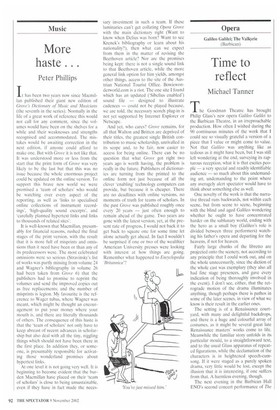More haste . . .
Peter Phillips
It has been two years now since Macmillan published their giant new edition of Grove's Dictionaey of Music and Musicians (the seventh in the series). Normally in the life of a great work of reference this would not call for any comment, since the volumes would have been on the shelves for a while and their weaknesses and strengths recognised and accommodated. The mistakes would be awaiting correction in the next edition, if anyone could afford to make one. But with Grove it is not like that. It was understood more or less from the start that the print form of Grove was very likely to be the last but that this was no issue because the whole enormous project could be updated on the online version. To support this brave new world we were promised a 'team of scholars' who would be watching over every aspect of the reporting, as well as 'links to specialised online collections of instrument recordings', 'high-quality sound excerpts', and 'carefully planned hypertext links and links to thousands of related sites'.
It is well-known that Macmillan, presumably for financial reasons, rushed the final stages of the print version, with the result that it is more full of misprints and omissions than it need have been or than any of its predecessors were. The most celebrated omissions were so serious (Stravinsky's list of works was partly missing from volume 24 and Wagner's bibliography in volume 26 had been taken from Grove 6) that the publishers had to promise to reprint the volumes and send the improved copies out as free replacements; and the number of misprints is legion. My favourite is the reference to Wager tubas, where Wagner was meant, which might be thought an encouragement to put your money where your mouth is, and there are literally thousands of others. The consequence of this haste is that the 'team of scholars' not only have to keep abreast of recent advances in scholarship but also deal with all the tiny, niggling things which should not have been there in the first place. In addition they, or someone, is presumably responsible for activating those wonderland promises about hypertext links.
At one level it is not going very well. It is beginning to become evident that the burden Macmillan have placed on their 'team of scholars' is close to being unsustainable, even if they have in fact made the neces sary investment in such a team. If these luminaries can't get collating Opera Grove with the main dictionary right (Want to know when Delius was born? Want to see Ksenek's bibliography or learn about his nationality?), then what can we expect from them in the matter of revising the Beethoven article? Nor are the promises being kept: there is not a single sound link to that Beethoven article, while the more general link option for him yields, amongst other things, access to the site of the Austrian National Tourist Office. Bowievvonderworld.com is a riot. The one site I found which has an updated (`Sibelius enabled') sound file — designed to illustrate cadences — could not be played because, we are told, the necessary scorch plug-in is not yet supported by Internet Explorer or Netscape.
And yet, who cares? Grove remains, for all that Walton and Britten are deprived of their titles, the greatest single British contribution to music scholarship, unrivalled in its scope and, to be fair, now easier to access for being online. There can be no question that what Grove got right two years ago is worth having, the problem is really in the future. Publishers of dictionaries are turning from the printed to the online form not just because of all the clever 'enabling' technology computers can provide, but because it is cheaper. There are no deadlines with online versions, no moments of truth for teams of scholars. In the past Grove was published roughly once every 20 years — just often enough to remain ahead of the game. Two years are gone with the latest version, yet, at the present rate of progress, I would not back it to get back to square one for some time let alone actually get ahead. In fact I wouldn't be surprised if one or two of the wealthier American University presses were looking with interest at how things are going. Remember what happened to Encyclopedia 'Britannica'?


















































































































 Previous page
Previous page